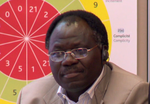Nkiko NSENGIMANA
contribution 13 -
NSENGIMANA Nkiko

transtlated version
Thank you. I was fortunate to have been part of the first conference on Rwanda in August 1994 in The Hague after the report of Mr. Degni Ségui, which recommended the setting up of the International Criminal Tribunal for Rwanda.
But before I ask specific questions to the Prosecutors, both ladies and gentlemen, I would like to explain a few things. The creation of the criminal tribunal in Rwanda was not due to the underdeveloped nature of the structures in Kigali. It was first of all because there was the quest for neutrality and a measure of the impartiality.
Secondly, I remember back then that when the first ideas were mooted, we should not forget that the Kigali government was opposed to the setting up of the International Criminal Tribunal for Rwanda. People forget this. It is well after that an agreement was set up and that the Rwandan government agreed on recognizing the Tribunal.
That leads me to the issue of the strategy and the independence of the Prosecutor. Now, on precisely three aspects, I would like to have the opinion of the Prosecutors with regard to their strategy and their independence.
You all recall the Degni Ségui report on the basis of which the International Criminal Tribunal for Rwanda was set up. It raised three crimes: Genocide, crimes against humanity, and war crimes violating the Geneva Convention. He proposed that the Tribunal should have jurisdiction over these three crimes. And effectively, it was agreed that the three crimes should fall within the jurisdiction of the Tribunal.
The first question: Why and how the Prosecutor, I’m referring to all of them, thus the institution of the prosecutor, why and how did he choose to prosecute only the crime of genocide?
Secondly. In the same report, Degni-Ségui stated that members of the former regime and members of the Rwandan Patriotic Front had committed crimes against humanity. I would like to know why and how the Prosecutor decided to investigate only the crimes of the former regime and not to investigate the alleged crimes of the RPF as stated in the Degni Ségui’s report.
My third question relates to the fact that in an investigation strategy one could choose to investigate some aspects that one considers important to the detriment of others. I would like to know why and how the Prosecutor decided not to investigate on the act of piracy, a piracy that claimed the lives of President Habyarimana and his counterparts, whereas that was the trigger factor of the genocide and the violation of the peace agreement and the ceasefire agreement concluded eight months earlier, that is, in August 1993.
Lastly, I would like to know, because it is a matter of choice and not a matter of lack of resources in these instances: Why did the Prosecutor, who pertinently knew or who should have known that some of the suspected criminals were at the summit of the Rwandan state, why with the knowledge of this fact did he decide to set up his office in Rwanda in Kigali?
Mr. Chairman, these are some of the questions I would like the Prosecutors to address for us. Thank you.
J.P. GETTI
Now, maybe the Prosecutors. Yes, Mrs. Del Ponte.

